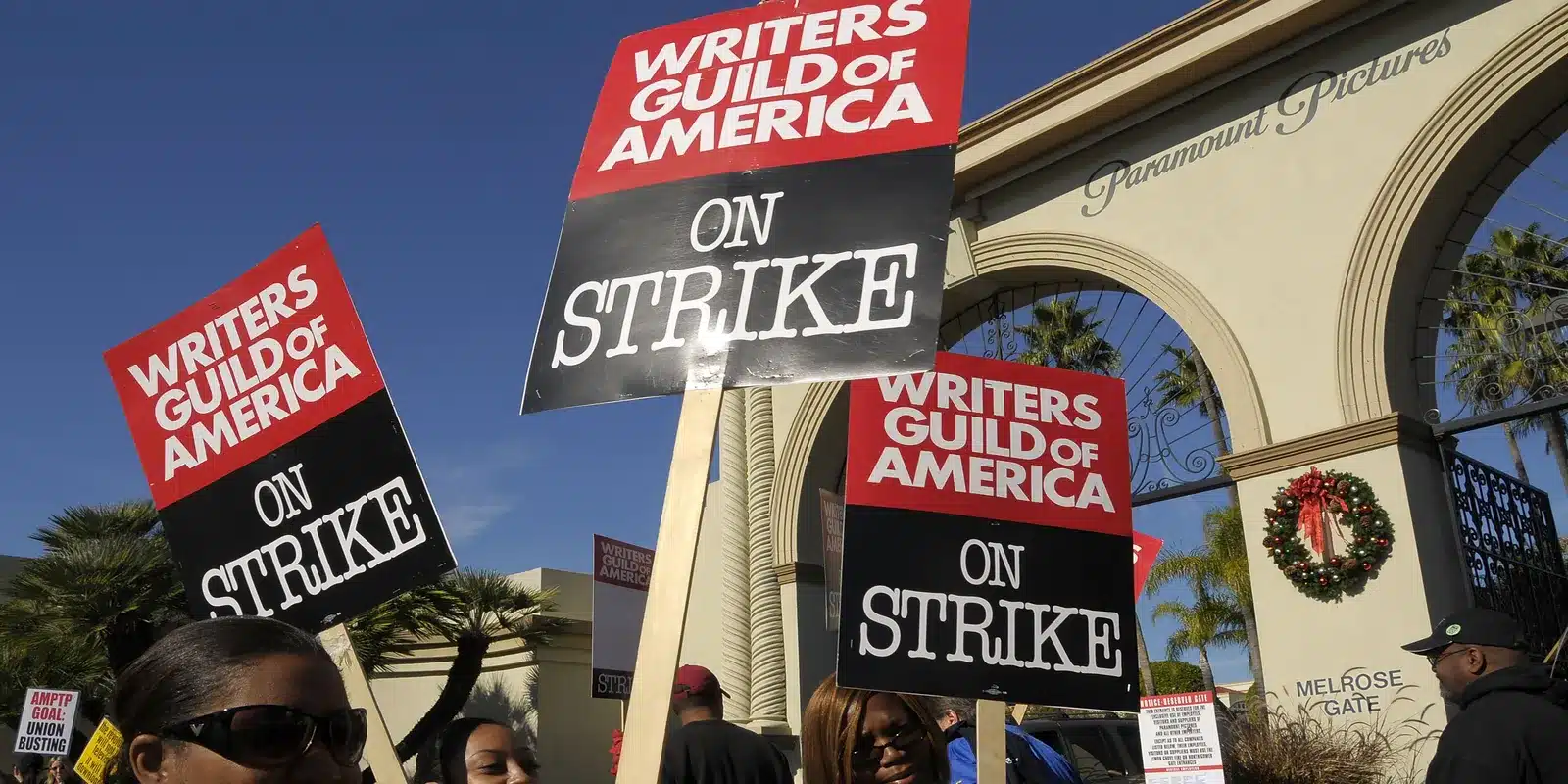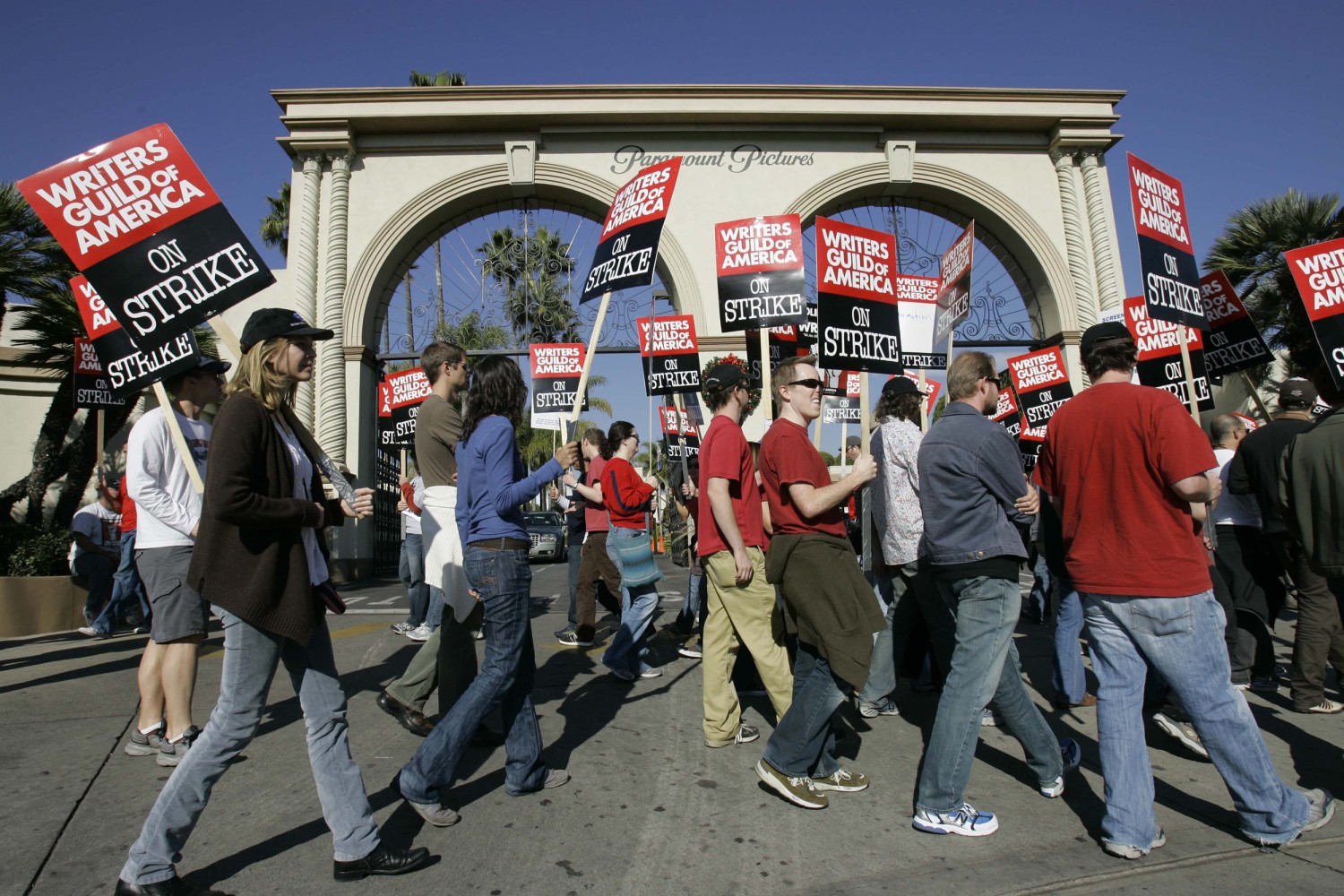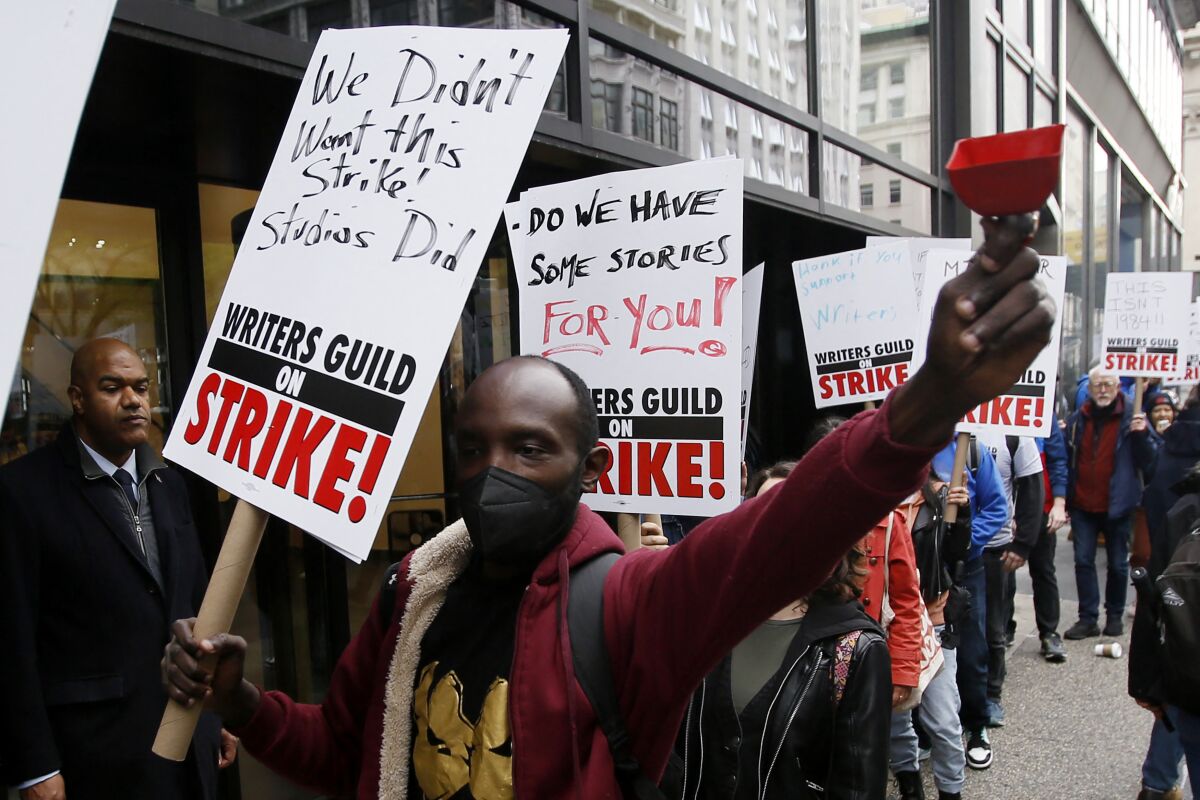NEW YORK — The first Hollywood strike in 15 years began Tuesday when the economic demands of the streaming era spurred unionized TV and film writers to picket outside major studios for better compensation, a work slowdown that has already forced most late-night shows to air reruns.
Members of the Writers Guild of America chanted outside the Manhattan headquarters where NBCUniversal was promoting their Peacock streaming service to advertisers, “No contracts, no content!”
After failing to agree on a new deal with the trade group representing Hollywood studios and production businesses, the union’s 11,500 film and television writers put down their pens and laptops.
The union is demanding greater minimum wages, more writers per program, and shorter exclusive contracts, among other things, all of which it claims have been eroded by the content explosion fueled by streaming.
“There’s too much work and not enough pay,” said demonstrator Sean Crespo, 46, a writer who worked on the former TBS show “Full Frontal With Samantha Bee.”
Depending on how long the strike lasts, the labor conflict could have a cascading effect on TV and film productions, and it comes at a time when streaming services are under increasing pressure from Wall Street to generate profitability.
Late-night television was the first to suffer the effects, just like during the 100-day writers’ strike 2007.
All the top late-night shows, staffed by writers who write monologues and jokes for their hosts, went dark immediately. Reruns were planned for NBC’s “The Tonight Show,” Comedy Central’s “Daily Show,” ABC’s Jimmy Kimmel Live,” CBS’s “The Late Show,” and NBC’s “Late Night” throughout the week.
NBC’s “Saturday Night Live,” which was set to air a fresh episode on Saturday, will likewise go black and instead air reruns.
“This nation owes so much to unions,” Colbert stated. “Unions are why we have weekends; by extension, we have TGI Fridays.”
“Everyone, including myself, hopes both sides can agree.” “However, I believe the writers’ demands are reasonable,” presenter Stephen Colbert stated on Monday’s “Late Show.”
“This nation owes so much to unions,” Colbert stated. “Unions are why we have weekends; by extension, we have TGI Fridays.”
Tony Kushner (“The Fabelmans”) and Danny Strong (“Dopesick”) were among those protesting in New York on Tuesday.
The strike’s influence on scripted shows and films will become apparent. Fall TV schedules could be thrown off if the strike lasts all summer. Meanwhile, those with completed scripts are permitted to continue filming.
Late-night hosts eventually returned to the air during the 2007 strike and improvised through broadcasts. When “Tonight” show host Jay Leno began writing his monologues, he enraged WGA leadership.
One late-night show will remain on the air. The network announced Tuesday that Fox News’ “Gutfeld!” with Greg Gutfeld will continue to run new episodes.
The Alliance of Motion Picture and Television Producers, representing studios and production groups, said it proposed “generous increases in compensation for writers as well as improvements in streaming residuals.”
The trade group stated that it was willing to increase its offer “but was unwilling to do so because of the magnitude of other proposals still on the table that the guild continues to insist upon.”
For months, many people have predicted a government shutdown. Last month, the writers unanimously voted to authorize a strike, with 98% of the membership in favor. Writers claim that income needs to keep up with inflation, that TV writer rooms have shrunk too much, and that the existing formula for calculating residuals must be redesigned.
Streaming has increased the number of series and films produced yearly, providing more opportunities for writers. However, writers claim they earn less than they used to while working under more stressful conditions. According to the WGA, “the companies’ behavior has created a gig economy inside a union workforce.”
Writers claim that income needs to keep up with inflation, that TV writer rooms have shrunk too much.
The union wants writers to be paid more in advance. This is because the advent of streaming has phased out many of the back-end fees that writers have historically profited from, such as syndication and international licensing.
According to the studios ‘ trade association, the main sticking points in reaching an agreement are so-called mini-rooms (the guild is seeking a minimum number of scribes per writer room) and the length of work contracts.
According to the writers’ organization, more flexibility is required for writers when they are contracted for series that are often shorter in duration than the once-standard 20-plus episode broadcast season. They also request stricter regulation over artificial intelligence, which authors believe might provide producers a faster way to complete a WGA writer’s work.
“Understand that our fight is the same fight that will be coming to your professional sector next: it’s the devaluing of human effort, skill, and talent in favor of automation and profits,” writer-director Justine Bateman stated.
Many studios and production companies are cutting back on their spending. The Walt Disney Company is laying off 7,000 people. Warner Bros. Discovery is lowering costs to reduce its debt. Netflix has put a damper on spending growth.
With a strike widely anticipated, writers have scrambled to get screenplays in, and studios have worked to prepare their pipelines to keep churning out content for the foreseeable future. However, the impact on local economies can be significant. Los Angeles lost $2.1 billion in economic production during the previous strike.
“From a business standpoint, we’re assuming the worst,” Warner Bros. Discovery CEO David Zaslav said last month. “We’ve prepared ourselves. There has been a lot of content produced.”
Overseas series could also help fill the void. “We have a large base of upcoming shows and films from around the world,” Netflix co-CEO Ted Sarandos said during the earnings call in April.
The WGA strike could be just the beginning. Both the Directors Guild of America and the actors’ union, SAG-AFTRA, have contracts that expire in June. Those bargaining sessions will discuss some of the same issues concerning the streaming business model.
On Tuesday, the actors’ union invited its members to join the writers’ picket lines in solidarity. ___
Aron Ranen and David Bauder contributed to this report.
SOURCE – (AP)












